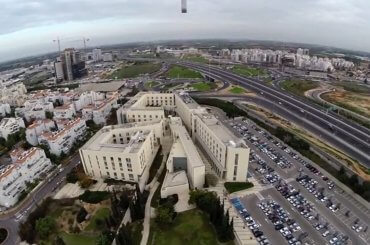This is part of Marc H. Ellis’s “Exile and the Prophetic” feature for Mondoweiss. To read the entire series visit the archive page.
When does the now approved international mantra that Israel’s occupation of the West Bank and the stranglehold on Gaza is unsustainable become unconscionable?
Politically. Religiously.
“Unsustainable.” At the United Nations where President Obama invoked it. As we approach Yom Kippur where some Jews, including rabbis, struggle with it.
For too many, the question of Israel – and Gaza – remains “unsustainable” – in theory. For the people of Gaza whose lives are filled with the debris of war, “unsustainable” in translation means death by air – and by sea.
The Malta refugee shipwreck which occurred earlier this month and claimed perhaps 500 lives, several hundred of them Palestinians from Gaza, haunts “unsustainable.” Those attempting to escape Gaza call forth a deeper awareness.
Our political statements and Yom Kippur confessions have to enter these dark waters.
The initial reports of the ships sinking should have been enough to cause people everywhere to sit up and take notice. The war in Gaza continues to claim Palestinian victims. But the reports keep flowing. The horror deepens.
Below are two excerpts as culled from the testimony of survivors. They aren’t easy to read. But then politics and confession when attentive to history is rarely easy.
On his third day at sea near the coast of Malta, Shukri al-Assouli began to hallucinate. He saw streets, houses and his mother, who greeted him with a smile back at home in the Gaza Strip. He wore the life vest of a man who had drowned and clung to an empty metal container. He then started to lose his strength. Exposure to the salt water had discolored his skin, his arms and legs had grown numb from the cold water and his fight to keep from drowning. Finally, a freighter ship saw them and pulled Assouli and five other survivors from the water. He thought it was a hallucination. “I had already figured I was going to die,” he says.
Assouli was flown by helicopter to the port city of Chania in Crete, where he spent five days in the hospital. He makes his way down the clinic hallway with unsteady footsteps, his eyes are reddened and the wrinkles on his forehead are furrowed. Although he’s been saved, he has also lost everything. He buries his head in his hands and cries. “How could the Europeans allow a crime like that to happen?” he asks. “Where is my wife? Where are my children?”
In all likelihood, his wife and children are now dead. It is a fate shared by almost all of the passengers who boarded the boat in Damietta, Egypt, which then capsized off the coast of Malta four days later on Sept. 6. Most were from the Palestinian territories, but passengers also hailed from Egypt, Syria and Sudan. They were pulled into the water, carried off by the current and sucked into the Mediterranean. By Friday, only 10 survivors had been found. Two were taken to Sicily, two to Malta and six to Crete…
Continuing:
After he paid, Shukri al-Assouli, his wife and their children were taken to Alexandria, Egypt. Their smugglers locked them in an apartment where they had to wait for several days. Then they were picked up in a minivan and passengers were taken in groups of 20 in a rubber dinghy to the ship, which was anchored at the waterfront. Al-Assouli says the cutter, which was overcrowded, wasn’t even 20 meters long. He says there were many women and around a hundred children on board. It was so cramped he couldn’t even stretch out his legs. As the ship began to move, it swayed and al-Assouli became seasick. His daughter cried and said, “I want to go back to my grandma.” He tried to comfort his children. “Don’t be afraid, we’ll soon be in Europe,” he said.
After four days at sea, another ship showed up that was also carrying smugglers. The men evidently needed the cutter and wanted to transport the refugees for the final miles of the journey in a smaller boat. The passengers refused. In response, the smugglers rammed the cutter without any warning, Assouli says. “We didn’t have any time to react.” A hole quickly developed in the side of the ship and the cutter filled with water within minutes. The 300 people who had been below decks had no time to escape and drown immediately. Assouli called out to his wife and children but couldn’t find them.
After the ship sank, around 80 survivors had to fend for themselves in the cold sea. The few survivors who were actually wearing life vests formed a circle and tried to help the others stay afloat. On the third day at sea, the weather grew inclement and the waves swelled until they were meters high.
“Each hour we lost another person to the sea,” says Abdelmazid Alhila, 24, another survivor. His arms are sunburned and his face full of scars. On the boat he met Mohamed Raad, 25. Neither had brought anything with them to eat, but they did have life vests. On the open sea, they clenched on to one another. Raad began hallucinating and almost took his life vest off. They urinated into bottles and drank from them. They also had to look on as one refugee after the other drowned and as mothers let their babies slide into the water when they ran out of energy. Alhila claims that four ships passed by but none stopped. “They just left us to die.” Both men had fled Gaza after their homes had been destroyed in bombing attacks. They knew the journey would be dangerous, but they didn’t anticipate just how bad it would be.
“Each hour we lost another person to the sea” – perhaps this should be the UN basis for their sessions and the Jewish refrain for the High Holidays.
Lost to sea because of a variety of circumstances and corruptions it is true. Misery attracts corrupt company.
But where did this ship’s fateful voyage actually begin? Did it begin with the Israeli invasion of Gaza this summer? The Israeli bombing of Gaza in 2012? The Israeli invasion of Gaza in 2009? Israel’s decades-long occupation/blockade of Gaza? The Arab-Israeli war in 1967? The 1948 war when Gaza became overwhelmingly populated by refugees from Israel’s creation?
You see the creation of Israel and the destruction of Palestine has been “unsustainable” from the outset. So it remains and will continue. Until it becomes unconscionable.
Will the world act then or will “unconscionable” become yet another excuse for inaction?



When? Not as long as Mr. Obama is President Obama, evidently.
PS: saying that the status quo is not sustainable is hardly true (to put it politely), as noted here:
http://www.lobelog.com/obama-unga-israel-palestine/
US active action on behalf of Israel and Israelis and its inaction wrt ANY justice for Palestinians is unconscionable and indefensible.
It’s been that way since the beginning of the Nakba.
I am reminded by this voice:
“He looked at me with his sad eyes, and replied, “Steven, I have grown up in a world in which I can sleep through bombs in my neighborhood, gunshots in my backyard. In my 30 years living, I have never been treated as a human being. Israel does not treat me as a human being. The international community does not treat me as a human being. No one has ever stood up for me. My dignity has been taken away, my humanity does not exist. This is the first time anyone—anyone—has ever stood up for me in any way. I just want to feel like a human in some way. I want peace, Steven. I don’t want anyone killed. But what is there for us to do? Every peace agreement we have, we only suffer more. We lose our land and our dignity. I just can’t take being treated like an animal any more.””
http://www.dukechronicle.com/articles/2014/09/24/american-jew-palestine
When people replace a tattered text for justice, humanity and law, we’ve gone astray. When people try to right a grave injustice toward some by imposing a grave injustice on others then there is no justice at all.
You have to have a conscience for something to become “unconscionable’ to you.
Israelis don’t, US zionist who support them don’t, the US leaders and most world leaders don’t.
So there you go.
I remember first hearing of the sinking of the ship carrying refugees to Malta on BBC radio. It was the headline story for the couple of hours that I listened that day. They interviewed two survivors (who they identified as Palestinian) but only limited them to the part of the trip involved in the sinking of the ship, and nothing about why they were on the ship to begin with or what would make them take such a risky voyage.
After the news break, a reporter came on to discuss the story in more detail. He mentioned the people coming from war-torn areas of Syria, Egypt & Africa. I think Gaza may have been mentioned once, but only as a kind of throw-away line. Israel was never mentioned once. The lies by omission were telling.
I think that moving “unsustainable” to “unconscionable” involves first allowing the Palestinians to appear outside of pre-existing narratives and letting their stories be told. Our corporate media is doing a lousy job of this at the moment, and that has to change.